ES
-
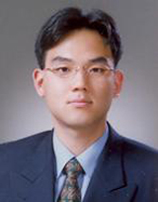 3rd KAIST Junghoon Cho Academic Award Ceremony
3rd KAIST Junghoon Cho Academic Award Ceremony
3rd KAIST Junghoon Cho Academic Award CeremonyAcademic award to Sehoon Kim, scholarship to Yougdae Kim, Daehyun Kim, Sunchul Park
KAIST (President Nam Pyo Suh) had the 3rd KAIST Junghoon Cho Academic Award ceremony at the conference room in the main administration building, Friday, May 11, at 2 pm with President Suh and the bereaved family attended.
Sehoon Kim, a doctoral researcher at the Agency for Defense Development (ADD) and KAIST graduate, was named as the 3rd recipient of the Junghoon Cho Academic Award in recognition of his achievement that establishes the design method of supersonic vacuum device. The scholarship was granted to Yongdae Kim (doctoral student of Aerospace Engineering, KAIST), Daehyun Kim (master student of Mechanical Engineering, Korea University), and Suncheol Park (senior of the Attached High School to the College of Education at kongju National University). The prize money is 20 million won, and the scholarship amounts to 3 million and 2 million won for university and high school students, respectively.
“Junghoon Cho Academic Award” is a meaningful award established by the donation of compensation money and personal properties, amounting to about 470 billion won, by Donggil Cho, father of the late Ph.D. Junghoon Cho who died at the explosion accident at the Wind Tunnel Laboratory in 2002, ▲ Ph.D. Sehonn Kim
2007.05.14 View 17408
3rd KAIST Junghoon Cho Academic Award Ceremony
3rd KAIST Junghoon Cho Academic Award Ceremony
3rd KAIST Junghoon Cho Academic Award CeremonyAcademic award to Sehoon Kim, scholarship to Yougdae Kim, Daehyun Kim, Sunchul Park
KAIST (President Nam Pyo Suh) had the 3rd KAIST Junghoon Cho Academic Award ceremony at the conference room in the main administration building, Friday, May 11, at 2 pm with President Suh and the bereaved family attended.
Sehoon Kim, a doctoral researcher at the Agency for Defense Development (ADD) and KAIST graduate, was named as the 3rd recipient of the Junghoon Cho Academic Award in recognition of his achievement that establishes the design method of supersonic vacuum device. The scholarship was granted to Yongdae Kim (doctoral student of Aerospace Engineering, KAIST), Daehyun Kim (master student of Mechanical Engineering, Korea University), and Suncheol Park (senior of the Attached High School to the College of Education at kongju National University). The prize money is 20 million won, and the scholarship amounts to 3 million and 2 million won for university and high school students, respectively.
“Junghoon Cho Academic Award” is a meaningful award established by the donation of compensation money and personal properties, amounting to about 470 billion won, by Donggil Cho, father of the late Ph.D. Junghoon Cho who died at the explosion accident at the Wind Tunnel Laboratory in 2002, ▲ Ph.D. Sehonn Kim
2007.05.14 View 17408 -
 Professor Yang Named Recipient of Dupont Science & Technology Award
Professor Yang Named Recipient of Dupont Science & Technology Award
- Named as the recipient of Dupont Science & Technology Award of 2007- In recognition of his development of optical?bio-functional photonic crystal structures through Self-assembly of nanoparticles
Seung-Man Yang, a professor of Chemical and Biomolecular Engineering of KAIST (President Nam Pyo Suh) and the president of the National Creative Research Initiatives Center for Photon and Fluid Integrated Circuit by the Ministry of Science and Technology, has been named as the recipient of Dupont Science & Technology Award.
Dupont Korea, associate of Dupont, a world-class science firm, has established and conferred ‘Dupont Science & Technology Award’ since 2002 to promote basic sciences and industrial development of Korea. Dupont Science & Technology Awards are awarded to scientists of universities or state-run institutes who have made outstanding R&D achievements in the fields of Chemistry, Chemical Engineering, Material Science and Material Engineering within five years. Dupont Korea announced on May 2, 2007 that Professor Yang is the recipient of the award this year, following the strict examination by the Koran Academy of Science and Technology (KAST).
The reason for the award is Professor Yang’s development of prototype optical?bio-functional photonic crystal structures that can process a huge amount of data, resulting from a study that has discovered the principle of Self-assembly where multifunctional nanoparticles are manufactured and assembled for themselves.
Professor Yang’s recent research result about photon structures and nano patterns was published by Nature (February 2, 2006 edition); posted on Heart-Cut, the portal site of the American Chemistry Society (ACS), as highlight paper two times (November 4, 2002 and May 1, 2006); and introduced at Research/Researcher of MRS Bulletin by the U.S. Material Research Society (MRS) as main paper in December 2003. Professor Yang is very famous in Korea and abroad for the excellences of his research achievements and has made request seminars at Harvard University, University of Wisconsin, Caltech, University of California, etc. He is also invited speaker and session organizer of the MRS and the SPIE.
2007.05.08 View 23371
Professor Yang Named Recipient of Dupont Science & Technology Award
Professor Yang Named Recipient of Dupont Science & Technology Award
- Named as the recipient of Dupont Science & Technology Award of 2007- In recognition of his development of optical?bio-functional photonic crystal structures through Self-assembly of nanoparticles
Seung-Man Yang, a professor of Chemical and Biomolecular Engineering of KAIST (President Nam Pyo Suh) and the president of the National Creative Research Initiatives Center for Photon and Fluid Integrated Circuit by the Ministry of Science and Technology, has been named as the recipient of Dupont Science & Technology Award.
Dupont Korea, associate of Dupont, a world-class science firm, has established and conferred ‘Dupont Science & Technology Award’ since 2002 to promote basic sciences and industrial development of Korea. Dupont Science & Technology Awards are awarded to scientists of universities or state-run institutes who have made outstanding R&D achievements in the fields of Chemistry, Chemical Engineering, Material Science and Material Engineering within five years. Dupont Korea announced on May 2, 2007 that Professor Yang is the recipient of the award this year, following the strict examination by the Koran Academy of Science and Technology (KAST).
The reason for the award is Professor Yang’s development of prototype optical?bio-functional photonic crystal structures that can process a huge amount of data, resulting from a study that has discovered the principle of Self-assembly where multifunctional nanoparticles are manufactured and assembled for themselves.
Professor Yang’s recent research result about photon structures and nano patterns was published by Nature (February 2, 2006 edition); posted on Heart-Cut, the portal site of the American Chemistry Society (ACS), as highlight paper two times (November 4, 2002 and May 1, 2006); and introduced at Research/Researcher of MRS Bulletin by the U.S. Material Research Society (MRS) as main paper in December 2003. Professor Yang is very famous in Korea and abroad for the excellences of his research achievements and has made request seminars at Harvard University, University of Wisconsin, Caltech, University of California, etc. He is also invited speaker and session organizer of the MRS and the SPIE.
2007.05.08 View 23371 -
 Prof. Hwang Inaugurated as 22nd President of KISS
Prof. Hwang Inaugurated as 22nd President of KISS
Kyu-Young Hwang, a professor of Computer Sciences, has been inaugurated as the 22nd president of the Korea Information Science Society (KISS). The KISS, established in 1973, is Korea’s largest computer science-related society holding about 4,000 members.
Prof. Hwang is now managing programs to issue the society’s publications and for information exchanges and putting huge efforts on promoting global cooperation and strengthening the partnership with overseas institutions to raise the society’s global standings. He is also making great efforts to enhance the capabilities and competitiveness of future human resources through a program to improve education systems concerning computer/ programming.
2007.04.30 View 14826
Prof. Hwang Inaugurated as 22nd President of KISS
Prof. Hwang Inaugurated as 22nd President of KISS
Kyu-Young Hwang, a professor of Computer Sciences, has been inaugurated as the 22nd president of the Korea Information Science Society (KISS). The KISS, established in 1973, is Korea’s largest computer science-related society holding about 4,000 members.
Prof. Hwang is now managing programs to issue the society’s publications and for information exchanges and putting huge efforts on promoting global cooperation and strengthening the partnership with overseas institutions to raise the society’s global standings. He is also making great efforts to enhance the capabilities and competitiveness of future human resources through a program to improve education systems concerning computer/ programming.
2007.04.30 View 14826 -
 Maximum Yield Amino Acid-Producing Microorganism Developed with use of System Biotechnology
Maximum Yield Amino Acid-Producing Microorganism Developed with use of System Biotechnology
A team led by Sang-Yup Lee, a distinguished professor of Chemical and Biomolecular Engineering and chair professor of LG Chemical, has succeeded in developing maximum yield L-valine-producing microorganism by using System Biotechnology methods. The research results will be published at the April fourth week (April 23 - 27) edition of the Proceedings of the National Academy of Sciences (PNAS) of the USA.
Prof. Lee’s team has developed maximum yield amino acid-producing microorganism (target substance of L-valine, an essential amino-acid) by using microorganism E cell system and simulation methods.
His team produced initial producing microorganism by selectively operating necessary parts in colon bacillus genome and excavated preliminary target gene which is to newly be operated through transcriptome analysis using DNA chips. Then they performed a great amount of gene deletion experiment on computer by using MBEL979, E-cells of colon bacillus, and excavated secondary engineering targets. And they finally succeeded in developing maximum yield valine-producing microorganism that can extract 37.8 grams of valine from 100 grams of glucose by applying experiment results to the actual development of microorganism so as to achieve the optimization of metabolic flux in cells,
Prof. Lee said, “Since successfully used for the development of microorganism on a systematic system level, system biotechnology methods are expected to significantly contribute to the development of all biotechnology-relevant industries. At the beginning, we had huge obstacles in fusing IT and BT, but my team mates cleverly overcame such obstacles, hence I’m very proud of them.” The producing microorganism and its developing methods are pending international applications (PCT).
2007.04.26 View 17898
Maximum Yield Amino Acid-Producing Microorganism Developed with use of System Biotechnology
Maximum Yield Amino Acid-Producing Microorganism Developed with use of System Biotechnology
A team led by Sang-Yup Lee, a distinguished professor of Chemical and Biomolecular Engineering and chair professor of LG Chemical, has succeeded in developing maximum yield L-valine-producing microorganism by using System Biotechnology methods. The research results will be published at the April fourth week (April 23 - 27) edition of the Proceedings of the National Academy of Sciences (PNAS) of the USA.
Prof. Lee’s team has developed maximum yield amino acid-producing microorganism (target substance of L-valine, an essential amino-acid) by using microorganism E cell system and simulation methods.
His team produced initial producing microorganism by selectively operating necessary parts in colon bacillus genome and excavated preliminary target gene which is to newly be operated through transcriptome analysis using DNA chips. Then they performed a great amount of gene deletion experiment on computer by using MBEL979, E-cells of colon bacillus, and excavated secondary engineering targets. And they finally succeeded in developing maximum yield valine-producing microorganism that can extract 37.8 grams of valine from 100 grams of glucose by applying experiment results to the actual development of microorganism so as to achieve the optimization of metabolic flux in cells,
Prof. Lee said, “Since successfully used for the development of microorganism on a systematic system level, system biotechnology methods are expected to significantly contribute to the development of all biotechnology-relevant industries. At the beginning, we had huge obstacles in fusing IT and BT, but my team mates cleverly overcame such obstacles, hence I’m very proud of them.” The producing microorganism and its developing methods are pending international applications (PCT).
2007.04.26 View 17898 -
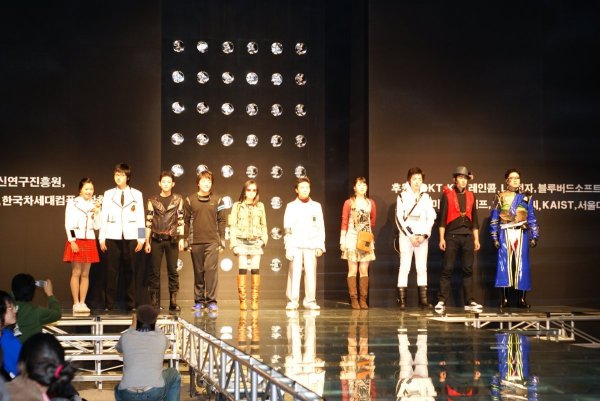 3rd Ubiquitous Fashionable Computer Contest
KAIST will be receiving until May 31, Thursday, applications for ‘the 3rd Ubiquitous Fashionable Computer (UFC)’ Contest, which will take place under the title of ‘Enjoy U-life with UFC’.
The contest has begun in 2005 by KAIST and the Korean Society for Next-Generation Computing to raise people’s concern over next-generation computing and to prepare for the upcoming ubiquitous era.
‘UFC’ refers to a wearable computer small and light enough to be worn on human bodies or clothes so that users can use computers with no restriction while moving. This terminology was created by Korea.
The contest includes designated items division and free items division, and not only university students but also general public can participate in the free items division. Teams qualified for the final contest in the designated items division will be offered wearable computer platform and 1.5 million won of production cost. The final contest will take place at the UFC fashion show stage ‘Next-Generation Computing Exhibition’ at KOEX in November.
Hee-Joon You, Co-president of the Contest Committee and a professor of Electrical Engineering, stressed on the future life made joyful by IT technologies by saying, “Considering the title of the contest, we’ve selected ‘games enjoyed with UFCs’ as a mission of the designated items division to combine games, rising software, and wearing computers, hardware.”
UFC is a brand-new field that fuses IT technologies and fashion, seeking the improvement of computer technologies and fashion creation. UFC, a further advanced wearable computer than existing ones, is an important advanced field that leads computer industries in the ubiquitous era.
2007.04.23 View 18518
3rd Ubiquitous Fashionable Computer Contest
KAIST will be receiving until May 31, Thursday, applications for ‘the 3rd Ubiquitous Fashionable Computer (UFC)’ Contest, which will take place under the title of ‘Enjoy U-life with UFC’.
The contest has begun in 2005 by KAIST and the Korean Society for Next-Generation Computing to raise people’s concern over next-generation computing and to prepare for the upcoming ubiquitous era.
‘UFC’ refers to a wearable computer small and light enough to be worn on human bodies or clothes so that users can use computers with no restriction while moving. This terminology was created by Korea.
The contest includes designated items division and free items division, and not only university students but also general public can participate in the free items division. Teams qualified for the final contest in the designated items division will be offered wearable computer platform and 1.5 million won of production cost. The final contest will take place at the UFC fashion show stage ‘Next-Generation Computing Exhibition’ at KOEX in November.
Hee-Joon You, Co-president of the Contest Committee and a professor of Electrical Engineering, stressed on the future life made joyful by IT technologies by saying, “Considering the title of the contest, we’ve selected ‘games enjoyed with UFCs’ as a mission of the designated items division to combine games, rising software, and wearing computers, hardware.”
UFC is a brand-new field that fuses IT technologies and fashion, seeking the improvement of computer technologies and fashion creation. UFC, a further advanced wearable computer than existing ones, is an important advanced field that leads computer industries in the ubiquitous era.
2007.04.23 View 18518 -
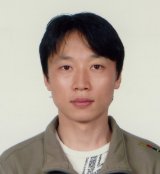 A doctorate of Mechanical Engineering Named Recipient of Best Student Paper Award at International Society
Seung-Min Ryu, a doctorate of Mechanical Engineering under the supervision of Professor Dong-Yul Yang, has been named as a recipient of the best student paper award of the Society for Information Display (SID).
The title of the paper is ‘the study on the fabrication of super-high resolution cathode separators by X-ray lithography processes’. He proposed at this paper the fabrication of 12 micron-thick cathode separators, which can fabricate further delicate separators than the current 50 micron-thick commercial PDP separators, thereby significantly improving the resolution of PDPs in the future.
Ryu will make an oral presentation on this paper and win the award at the SID conference, which will take place in the U.S. for six days from May 20.
2007.04.23 View 18814
A doctorate of Mechanical Engineering Named Recipient of Best Student Paper Award at International Society
Seung-Min Ryu, a doctorate of Mechanical Engineering under the supervision of Professor Dong-Yul Yang, has been named as a recipient of the best student paper award of the Society for Information Display (SID).
The title of the paper is ‘the study on the fabrication of super-high resolution cathode separators by X-ray lithography processes’. He proposed at this paper the fabrication of 12 micron-thick cathode separators, which can fabricate further delicate separators than the current 50 micron-thick commercial PDP separators, thereby significantly improving the resolution of PDPs in the future.
Ryu will make an oral presentation on this paper and win the award at the SID conference, which will take place in the U.S. for six days from May 20.
2007.04.23 View 18814 -
 Prof. Bien Named IFSA Fuzzy Fellow
Prof. Bien Named IFSA Fuzzy Fellow
Zeungnam Bien, a professor of Electrical Engineering, has been named a Fuzzy Fellow of the International Fuzzy Systems Association (IFSA).
IFSA Fuzzy Fellows are named by the Fuzzy Fellows Committee based on the degree of technical contributions to the fuzzy set and its relevant fields and the degree of contribution for the establishment of fundaments in the field of advanced applied technologies development and fuzzy fields. IFSA has named total 36 fellows since its first one at the world congress in Prague in 1997.
Professor Bien has worked as the chairman of the IFSA and will be officially named a Fuzzy Fellowship at the IFSA World Congress at Cancun, Mexico in June.
2007.04.19 View 17798
Prof. Bien Named IFSA Fuzzy Fellow
Prof. Bien Named IFSA Fuzzy Fellow
Zeungnam Bien, a professor of Electrical Engineering, has been named a Fuzzy Fellow of the International Fuzzy Systems Association (IFSA).
IFSA Fuzzy Fellows are named by the Fuzzy Fellows Committee based on the degree of technical contributions to the fuzzy set and its relevant fields and the degree of contribution for the establishment of fundaments in the field of advanced applied technologies development and fuzzy fields. IFSA has named total 36 fellows since its first one at the world congress in Prague in 1997.
Professor Bien has worked as the chairman of the IFSA and will be officially named a Fuzzy Fellowship at the IFSA World Congress at Cancun, Mexico in June.
2007.04.19 View 17798 -
 KAIST Opens CFTS
- To research the prevention of the illegal production of security technologies
- Total 1.5 billion won of research expenses and 102 researchers to be invested for the next three years- Opening ceremony at the computer science building, KAIST on April 13 at 10 am
KAIST (President Nam-Pyo Suh) will open ‘the Center of Fusion Technology for Security (CFTS)’ under the auspices of the Korea Minting & Security Printing Corporation (KOMSCO, President Hae-Sung Lee) to undertake researches over the prevention of illegal reproduction of security technologies. The opening ceremony was held at the computer science building, KAIST on Friday, April 13.
Total .1.5 billion won of research expenses and 102 researchers will be invested in the center for the next three years.
Main research fields are ▲ advanced IT-based information concealment methods ▲ utilization of energy transfer luminescence in host guest nano-substances ▲ the utilization of quantum-dot, non-crystal carbon and piezoelectric elements ▲ development of radio frequency identification (RFID), optical, biological security element-applied technologies, etc.
“We’ll develop fusion technologies for security that can easily detect forgeries and alterations of security products by introducing advanced IT, optical, chemical engineering, and biological elements. The development of core technologies applied to security products will activate domestic security markets and enable the export of relevant technologies,” said General Research Director Heung-Kyu Lee, a professor of Computer Sciences.
2007.04.19 View 17785
KAIST Opens CFTS
- To research the prevention of the illegal production of security technologies
- Total 1.5 billion won of research expenses and 102 researchers to be invested for the next three years- Opening ceremony at the computer science building, KAIST on April 13 at 10 am
KAIST (President Nam-Pyo Suh) will open ‘the Center of Fusion Technology for Security (CFTS)’ under the auspices of the Korea Minting & Security Printing Corporation (KOMSCO, President Hae-Sung Lee) to undertake researches over the prevention of illegal reproduction of security technologies. The opening ceremony was held at the computer science building, KAIST on Friday, April 13.
Total .1.5 billion won of research expenses and 102 researchers will be invested in the center for the next three years.
Main research fields are ▲ advanced IT-based information concealment methods ▲ utilization of energy transfer luminescence in host guest nano-substances ▲ the utilization of quantum-dot, non-crystal carbon and piezoelectric elements ▲ development of radio frequency identification (RFID), optical, biological security element-applied technologies, etc.
“We’ll develop fusion technologies for security that can easily detect forgeries and alterations of security products by introducing advanced IT, optical, chemical engineering, and biological elements. The development of core technologies applied to security products will activate domestic security markets and enable the export of relevant technologies,” said General Research Director Heung-Kyu Lee, a professor of Computer Sciences.
2007.04.19 View 17785 -
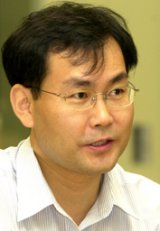 Prototype technologies for world highest efficiency PDP lightening developed by Prof. Choi
- Core technologies that will solve power consumption problems in PDPs- To be unveiled as invited paper at conference by Society for Information Display in May
A domestic research team has developed prototype technologies for high efficiency lightening that can significantly improve the power consumption of Plasma Display Panels (PDP).
A team headed by Kyung Cheol Choi, a professor of Electrical & Computer Science in KAiST (President Nam-Pyo Suh), has developed new cell structures and driving methods of PDP, typical digital television, which can increase the luminous efficacy of PDP four times and are to be unveiled at the conference by the Society for Information Display (SID) as an invited paper. The SID is the world largest information display society and the conference will be held at Long Beach, CA, U.S. on May 21.
Prof. Choi
2007.04.18 View 15789
Prototype technologies for world highest efficiency PDP lightening developed by Prof. Choi
- Core technologies that will solve power consumption problems in PDPs- To be unveiled as invited paper at conference by Society for Information Display in May
A domestic research team has developed prototype technologies for high efficiency lightening that can significantly improve the power consumption of Plasma Display Panels (PDP).
A team headed by Kyung Cheol Choi, a professor of Electrical & Computer Science in KAiST (President Nam-Pyo Suh), has developed new cell structures and driving methods of PDP, typical digital television, which can increase the luminous efficacy of PDP four times and are to be unveiled at the conference by the Society for Information Display (SID) as an invited paper. The SID is the world largest information display society and the conference will be held at Long Beach, CA, U.S. on May 21.
Prof. Choi
2007.04.18 View 15789 -
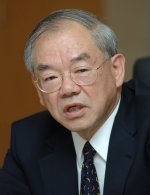 President Nam-Pyo Suh Receives Lifetime Achievement Award from SPE
President Nam-Pyo Suh has been selected as a recipient of the Lifetime Achievement Award by the Society of Plastic Engineers (SPE).
The SPE is the largest professional organization that promotes polymer-related R&D.
The SPE announced that it recognizes President Suh’s many contributions to the field of polymer processing. President Suh established the first university/industry cooperative research program at MIT known as the MIT-Industry Polymer Processing Program, which became a model in establishing similar programs at many other universities by NSF. Among the many new materials, products and manufacturing processes invented by him are: Microcellular plastics, known as MuCell and used commercially worldwide, USM high pressure foam molding technology, electrostatic charge-decay NDE technique for polymeric materials, and foam/straight plastic lamination process (a major industrial product).
2007.04.12 View 16926
President Nam-Pyo Suh Receives Lifetime Achievement Award from SPE
President Nam-Pyo Suh has been selected as a recipient of the Lifetime Achievement Award by the Society of Plastic Engineers (SPE).
The SPE is the largest professional organization that promotes polymer-related R&D.
The SPE announced that it recognizes President Suh’s many contributions to the field of polymer processing. President Suh established the first university/industry cooperative research program at MIT known as the MIT-Industry Polymer Processing Program, which became a model in establishing similar programs at many other universities by NSF. Among the many new materials, products and manufacturing processes invented by him are: Microcellular plastics, known as MuCell and used commercially worldwide, USM high pressure foam molding technology, electrostatic charge-decay NDE technique for polymeric materials, and foam/straight plastic lamination process (a major industrial product).
2007.04.12 View 16926 -
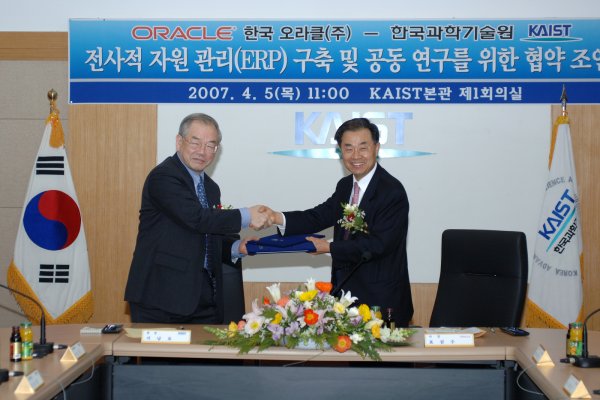 KAIST-Oracle Korea agrees on industry-academy cooperation
- To establish ERP systems throughout the entire fields of KAIST to provide advanced education and research services
- To perform Joint R&D in the field of ubiquitous- Agreement signed at KAIST on April 5
KAIST (President Nam-Pyo Suh) and Oracle Korea (President Sam-Soo Pyo) signed an agreement on the industry-academy cooperation program for the establishment and joint researches of advanced education services system on April 5 at 11 am.
KAIST and Oracle Korea will establish an Enterprise Resource Planning (ERP) system ‘ORACLE People Soft (PSFT) Campus Solution’ at KAIST. ‘PSFT Campus Solution’ refers to a university-oriented ERP system dominating world market share and will be introduced to KAIST for the first time among Korean universities. The establishment of ERP system and next-generation web services throughout KAIST will enhance KAIST’s management abilities over education and research, thereby making possible the offering of advanced education services. The both also agreed to promote joint researches in the field of ubiquitous.
Major cooperation items are ▲ the establishment and operation of ERP systems, ▲ the creation of advanced education services model for universities in Korea and East Asia and the setting-up of foundation for standard information services, ▲ the exploration of and participation in joint concerns, ▲ the establishment of joint information association for the exchanges of science and technology information, ▲ joint researches and development projects by the both parties, and ▲ education and training for the advancement of education institutes.
“The cooperation with world-class IT corporate Oracle can produce significant fruits of human power fostering and technology development in advanced fields,” KAIST President Nam-Pyo Suh said.
“The industry-academy cooperation by Oracle having a variety of world’s top IT technologies and KAIST will be a stepping stone for the advancement of domestic education institutes. I’ll devote myself to developing the models of state-of-the-art universities in the 21st century via close mutual cooperation,” said Sam-Soo Pyo, President of Oracle Korea.
2007.04.12 View 20062
KAIST-Oracle Korea agrees on industry-academy cooperation
- To establish ERP systems throughout the entire fields of KAIST to provide advanced education and research services
- To perform Joint R&D in the field of ubiquitous- Agreement signed at KAIST on April 5
KAIST (President Nam-Pyo Suh) and Oracle Korea (President Sam-Soo Pyo) signed an agreement on the industry-academy cooperation program for the establishment and joint researches of advanced education services system on April 5 at 11 am.
KAIST and Oracle Korea will establish an Enterprise Resource Planning (ERP) system ‘ORACLE People Soft (PSFT) Campus Solution’ at KAIST. ‘PSFT Campus Solution’ refers to a university-oriented ERP system dominating world market share and will be introduced to KAIST for the first time among Korean universities. The establishment of ERP system and next-generation web services throughout KAIST will enhance KAIST’s management abilities over education and research, thereby making possible the offering of advanced education services. The both also agreed to promote joint researches in the field of ubiquitous.
Major cooperation items are ▲ the establishment and operation of ERP systems, ▲ the creation of advanced education services model for universities in Korea and East Asia and the setting-up of foundation for standard information services, ▲ the exploration of and participation in joint concerns, ▲ the establishment of joint information association for the exchanges of science and technology information, ▲ joint researches and development projects by the both parties, and ▲ education and training for the advancement of education institutes.
“The cooperation with world-class IT corporate Oracle can produce significant fruits of human power fostering and technology development in advanced fields,” KAIST President Nam-Pyo Suh said.
“The industry-academy cooperation by Oracle having a variety of world’s top IT technologies and KAIST will be a stepping stone for the advancement of domestic education institutes. I’ll devote myself to developing the models of state-of-the-art universities in the 21st century via close mutual cooperation,” said Sam-Soo Pyo, President of Oracle Korea.
2007.04.12 View 20062 -
 KAIST Names Three Distinguished Professors
KAIST Names Three Distinguished Professors
- Three professors having achieved world’s distinguished research and education performances- Special incentives and non full-time position after retirement age to be offered
KAIST (President Nam-Pyo Suh) has named three Distinguished Professors, the most honorable positions in KAIST, for the first time in its history.
The three professors are Choong-Ki Kim, Dep. of Computer Science, Sang-Yup Lee, Dep. of Chemical and Biomolecular Engineering, and Kee-Joo Chang, Dep. of Physics.
Professor Kim has made significant contributions to the advancement of Korea’s semiconductor field. He developed and put into a practical use ‘CCD Imaging Element’, a core technology in the multimedia era and the most widely used imaging sensor, for the first time in the world. He also promoted special education programs with industrial bodies such as Samsung Electronics, Hynix Semiconductor, etc. to improve industry-academy cooperation programs of KAIST. In recent years, he is showing passionate activities for the development of KAIST, such as genius education, interdisciplinary education by the Graduate School of Culture Technology, and experiment education for undergraduate students. He received Hoam Prize in 1993 and the Order of Civil Merit Moran Medal in 1997, and is an IEEE fellow and the former Vice-president of KAIST.
Professor Lee has showed outstanding performances in the field of Metabolic Engineering. He discovered the genome sequences of bacteria for the first time in the world and published a paper regarding his discovery applied to metabolic engineering technologies at Nature Biotechnology in 2004. He also published a 78-page paper, evaluated as the bible of prteomics, at the 70 years long Microbiology and Molecular Biology Review (MMBR). His research performances are 187 domestic and international papers, 203 patent applications, Young Scientist Award, 212 invited lectures from home and abroad, etc.
Professor Chang has published about 200 papers in the field of Sold-State Physics and presented diverse theory models regarding semiconductor materials, his major research fields, at review articles, textbooks, academic conferences, etc. Particularly, he found out the essences of DX defects in GaAs semiconductors, a problem that had remained unsolved more than 10 years, and his paper on this has been cited so far more than 500 times. Professor Chang, named as one of the Nation’s Great Scholars in 2005, has 15 papers as cited more than 100 times and records the number of citation indexed by SCI at 4,847, third place among all scientists in Korea.
Distinguished Professors are the most honorable positions in KAIST, and only professors achieving world’s distinguished research and education performances can be Distinguished Professors. Being Distinguished Professors demands recommendations from President, Vice-president, Deans of College, and Department Heads and favorable evaluations by domestic and overseas professionals. Distinguished Professors will be offered special incentives and appointed as non full-time faculty even after their full retirement age.
KAIST will hire outstanding human resources in highly promising research fields through its novice systems including Distinguished Professors System, etc. to build and retain world’s best faculty.
2007.03.19 View 18920
KAIST Names Three Distinguished Professors
KAIST Names Three Distinguished Professors
- Three professors having achieved world’s distinguished research and education performances- Special incentives and non full-time position after retirement age to be offered
KAIST (President Nam-Pyo Suh) has named three Distinguished Professors, the most honorable positions in KAIST, for the first time in its history.
The three professors are Choong-Ki Kim, Dep. of Computer Science, Sang-Yup Lee, Dep. of Chemical and Biomolecular Engineering, and Kee-Joo Chang, Dep. of Physics.
Professor Kim has made significant contributions to the advancement of Korea’s semiconductor field. He developed and put into a practical use ‘CCD Imaging Element’, a core technology in the multimedia era and the most widely used imaging sensor, for the first time in the world. He also promoted special education programs with industrial bodies such as Samsung Electronics, Hynix Semiconductor, etc. to improve industry-academy cooperation programs of KAIST. In recent years, he is showing passionate activities for the development of KAIST, such as genius education, interdisciplinary education by the Graduate School of Culture Technology, and experiment education for undergraduate students. He received Hoam Prize in 1993 and the Order of Civil Merit Moran Medal in 1997, and is an IEEE fellow and the former Vice-president of KAIST.
Professor Lee has showed outstanding performances in the field of Metabolic Engineering. He discovered the genome sequences of bacteria for the first time in the world and published a paper regarding his discovery applied to metabolic engineering technologies at Nature Biotechnology in 2004. He also published a 78-page paper, evaluated as the bible of prteomics, at the 70 years long Microbiology and Molecular Biology Review (MMBR). His research performances are 187 domestic and international papers, 203 patent applications, Young Scientist Award, 212 invited lectures from home and abroad, etc.
Professor Chang has published about 200 papers in the field of Sold-State Physics and presented diverse theory models regarding semiconductor materials, his major research fields, at review articles, textbooks, academic conferences, etc. Particularly, he found out the essences of DX defects in GaAs semiconductors, a problem that had remained unsolved more than 10 years, and his paper on this has been cited so far more than 500 times. Professor Chang, named as one of the Nation’s Great Scholars in 2005, has 15 papers as cited more than 100 times and records the number of citation indexed by SCI at 4,847, third place among all scientists in Korea.
Distinguished Professors are the most honorable positions in KAIST, and only professors achieving world’s distinguished research and education performances can be Distinguished Professors. Being Distinguished Professors demands recommendations from President, Vice-president, Deans of College, and Department Heads and favorable evaluations by domestic and overseas professionals. Distinguished Professors will be offered special incentives and appointed as non full-time faculty even after their full retirement age.
KAIST will hire outstanding human resources in highly promising research fields through its novice systems including Distinguished Professors System, etc. to build and retain world’s best faculty.
2007.03.19 View 18920